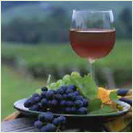What’s the buzz on resveratrol?
 A natural substance in red wine, known as resveratrol (RSV), offsets the unhealthy effects of a high-calorie diet in mice and significantly extends their life span, according to an article published in The International Herald Tribune, and in The Washington Post.
A natural substance in red wine, known as resveratrol (RSV), offsets the unhealthy effects of a high-calorie diet in mice and significantly extends their life span, according to an article published in The International Herald Tribune, and in The Washington Post.
In this study, mice fed the high-calorie diet became “tubby,” while those who got the high-fat diet plus RSV did not. The full study is online at the journal, Cell. (Vol 127, #4, November 16, 2006)
What are the implications?
It’s possible — if humans respond like mice — that RSV could offset the unhealthy effects of obesity caused by a high-calorie diet.
Resveratrol is found in the skin of grapes and in red wine and is conjectured to be a partial explanation for the French paradox — the ability of the French to enjoy a high-fat diet yet suffer less heart disease than Americans.
Caution. The amount of RSV used in animals was 200 or 400 mg/kg/day. At the low end, that’s 14,000 mg per day for a 70 kg (154 pound) person. It’s about the same as you or me drinking about 100 glasses of red wine each day, or taking about 700, 20 mg capsules of resveratrol!
Obviously, more research and development will be needed.
11/17/06 16:51 JR